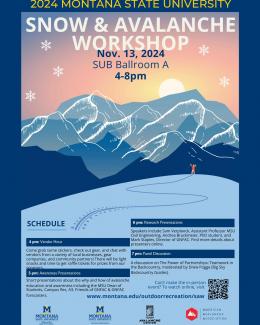This is Alex Marienthal with pre-season avalanche, weather and event information for the Gallatin National Forest Avalanche Center on Wednesday, November 13th. This information is sponsored by Spark R&D and The Friends of The Avalanche Center. We will update this bulletin as conditions warrant.
This morning (Wednesday) temperatures are teens to 20s F and wind is out of the southwest and northwest at 10-20 mph with gusts of 30-45 mph. Snow showers over the last couple days dropped 3-5” of snow in the mountains. For the second half of this week daytime temperatures will reach high 20s to mid-30s F with lows in the teens and low 20s F. Today and tomorrow winds will be out of the southwest at 15-20 mph with gusts of 30-40 mph. Skies will be mostly clear until the next measurable round of snowfall arrives late Friday or Saturday, with some light snowfall in the southern part of our area tonight and tomorrow.
All Regions
Over the last month small storms have grown the snow depth to 10-18” at mountain weather stations (weather log). After snowfall a week ago there were skier triggered and natural avalanches (avalanche activity). Many of these avalanches were on wind-loaded slopes and broke at the base of the shallow snowpack (photo from northern Bridger crown). Additionally, multiple skiers reported finding weak snow at the bottom of the snowpack in Hyalite, near Big Sky and the Bridger Range (observation page). The shallow snowpack changes a lot from day to day, but the avalanches and observations from last week are evidence that it is time to be prepared. Carefully assess the terrain and snowpack for avalanche potential, and carry the proper gear (beacon, shovel, probe).
Avalanches are most likely where recent snow has drifted into thicker slabs. On steeper slopes this coincides with the best place to ski or ride because the deeper snowpack provides better coverage of rocks and hazards. Mark describes this early season dilemma in his recent video from Fairy Lake, and advises to give the snow time after the snow falls and wind blows. If you see evidence of recent wind-loading, be patient and ride lower angle or non-wind loaded slopes.
The early season snowpack will be the foundation for future storms and is constantly changing. In Mark’s videos from the Bridger Range and Island Park last weekend, he shows that the snow has become weak from cold temperatures and clear nights. This could lead to fresh drifts being easier to trigger.
If you intend to ride or cross steep slopes, watch for signs of instability such as recent avalanche activity, shooting cracks and collapsing. If obvious signs are absent, dig a quick snowpit to assess for instability.
Public observations are incredibly valuable as we develop a picture of the season's snowpack. Contribute to our community’s knowledge by submitting your observations, and look through our observation page for additional information before your next backcountry adventure.
Upcoming Avalanche Education and Events
Our education calendar is full of awareness lectures and field courses. Check it out: Events and Education Calendar
TONIGHT!!! 4-8 p.m., Montana State University Snow and Avalanche Workshop. Open to the public.
Thursday, November 14, 6:30-9 p.m., Earn Your Turns Night with Spark R&D at the Rialto. Fundraiser for the Friends of the GNFAC.
Thursday, November 21, 6-7 p.m., Free Avalanche Awareness for Families and Friends at Story Mill Community Center.
Tuesday, November 26, 6-7 p.m. Free Avalanche Awareness at REI Bozeman.
Monday, December 2, 6:30 p.m. MAP community partnership night and 1-hr Avalanche Awareness, at MAP Brewing
For an intro class with a field day, Register for our Avalanche Fundamentals course.
Friends Fall Powder Blast Fundraiser!
Thanks to your donations and a successful Powder Blast Fundraiser, The Friends of the Avalanche raised 75% of the fall fundraising goal. We are working to finish off the remaining $17,000 to fund free and low-cost avalanche education, beacon checkers at trailheads, beacon parks for public training, weather stations and support avalanche center operations. So, if you missed the party last week and want to support avalanche outreach and education, you can still contribute to the fall fundraising campaign HERE.
Join us tonight at MSU SAW from 4-8 p.m. Montana State University Snow and Avalanche Workshop


